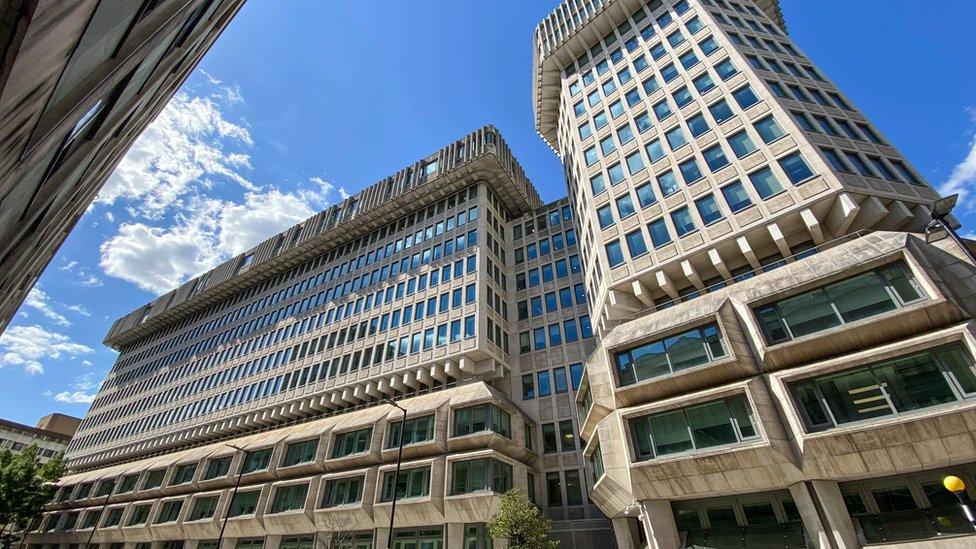Coronavirus: Court plan will not ease delays, lawyers warn
- Published

Hundreds of thousands of people may wait until 2022 for justice despite a government announcement to speed up work in the Crown Courts, lawyers warn.
Ministers unveiled measures - including holding suspects for longer in England and Wales - in an attempt to manage pressure on courts amid the pandemic.
But critics say delays in criminal courts are entirely of the government's making and pre-date coronavirus.
More than 9,000 trials have been put back since the UK went into lockdown.
On Sunday, the Ministry of Justice announced that it wants Parliament to pass temporary legislation to extend the time that defendants can be held in custody in England and Wales while awaiting trial.
The law is one of the most important wheels of the criminal justice machine because it ensures that justice is as swift as possible for both suspects and victims.
At present, defendants can only be held for 182 days after their first appearance in court, before there has to be an application to a judge to keep them inside for longer.
Under the government's proposal, from the end of this month that will be two months longer.
In practice, this decision builds more time into the court system - and it is part of a package of measures to manage the impact of coronavirus on the courts.

The Ministry of Justice's main offices in Westminster will house a temporary court to ease the backlog
Judges and court managers are struggling to find enough space to safely manage the social distancing of hundreds of people who would normally come into their buildings every day.
But criminal barristers say that the government's case is disingenuous. They say the delays to justice are of the government's own making, not because of coronavirus.
They accuse ministers of taking a political decision to introduce yet more delay - which could lead to cases collapsing if witnesses withdraw cooperation - rather than finding the cash to get more courts operational.
According to official figures, more than 37,000 Crown Court cases were outstanding before the pandemic struck, external the UK.
The Criminal Bar Association (CBA), which represents barristers who prosecute and defend across the country, says the backlog is now 43,000.
In recent years, the number of courtrooms in regular use has fallen as part of cuts to the courts budget - and as the number of sitting days has fallen, the backlog of cases has grown.
'Crisis they created'
James Mulholland QC, chairman of the CBA, said that the delays to justice were damaging to suspects, victims and witnesses.
"You don't resolve the delays by incorporating further delays into the system," he said. "The people you punish unfairly by this mechanism are not only those wrongly accused of crime, because not everyone in custody is guilty - but the witnesses who will have to wait even longer to be heard."
"The backlog could have gone away if the government had allowed judges to sit. Then along comes Covid, and the crisis that they've created, they can't properly address."
Justice Secretary Robert Buckland said the government's wider package of measures will get the criminal courts system "back to where it needs to be".
"This temporary extension to custody time limits will keep victims and the public safe, and we should not apologise for making that our priority," he said.
"At the same time, the measures I have announced today will get the criminal courts system back to where it needs to be - reducing delays and delivering speedier justice for all."

SOCIAL DISTANCING: What are the rules now?
SUPPORT BUBBLES: What are they and who can be in yours?
FACE MASKS: When do I need to wear one?

The latest plan includes installing plastic screens in often cramped and confined courtrooms to help reduce the risk of virus spread.
The government has already opened 10 "Nightingale" court sites - additional facilities to help manage the burden. But only two are dedicated to criminal work.
The Ministry of Justice has now pledged an extra 1,600 court staff and £80m towards more Nightingale courts for crime.
But barristers say the money being spent on warehousing defendants could be better spent on getting existing courts operational.
- Published19 July 2020

- Published19 June 2020

- Published12 January 2021
